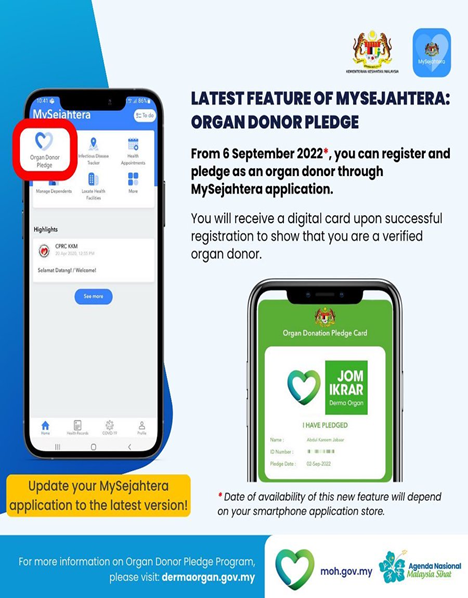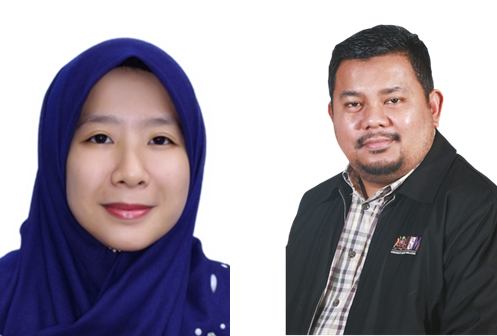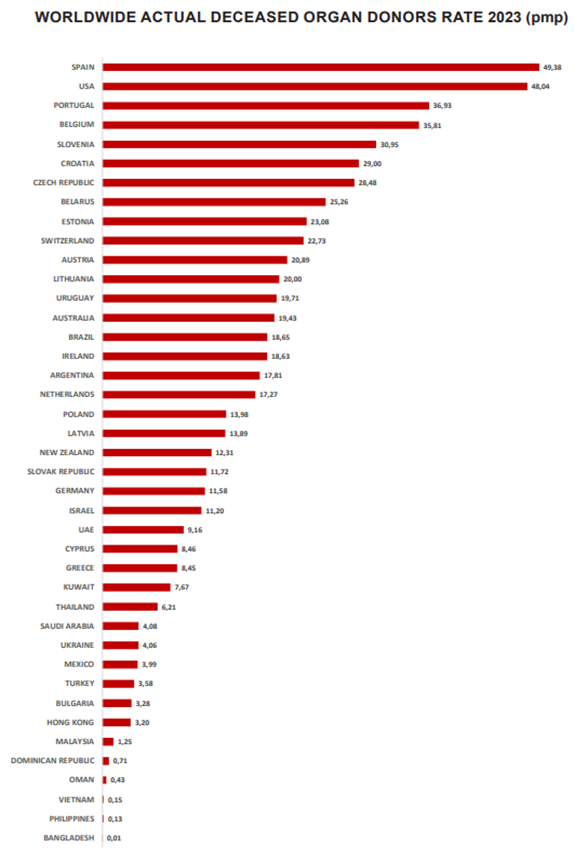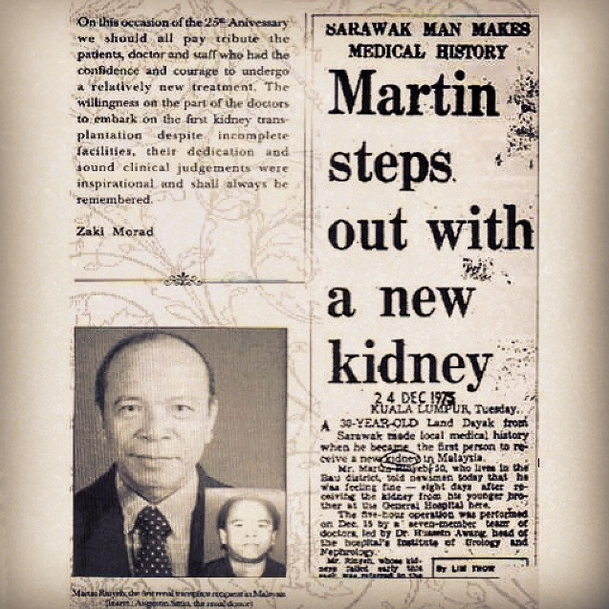
Latest Feature of MySejahtera: Organ Donor Pledge



The Importance of Organ Donation
The gap between organ demand and availability is substantial. In Malaysia, the number of patients awaiting organ transplants far exceeds the available donors, leading to prolonged suffering for those on waiting lists and, unfortunately, preventable deaths. This urgent need highlights the importance of promoting organ donation awareness and encouraging Malaysians to consider becoming donors.
Current State of Organ Donation in Malaysia
In Malaysia, organ donation started in the 1970s, yet the number of deceased organ donors remains less than 500. According to the Malaysian Ministry of Health, the number of individuals waiting for organ transplants, particularly kidneys, has been steadily rising in recent years due to the high incidence of kidney failure which is primarily caused by rising rates of diabetes and hypertension in the country. As of today, the registration listed 11171 adults, 309 children as kidney transplant recipients, 1 adult and 5 children as liver transplant recipients, 15 heart recipients, 2 lungs and 5 heart and lung recipients. According to INTERNATIONAL REGISTRY IN ORGAN DONATION AND TRANSPLANTATION (IRODAT) 2023 report, Malaysia is one of the lowest rates of deceased organ donation in the region which is 1.5 per million population (pmp), compared to 49.38 pmp in Spain, 48.03 pmp in USA, 4.08 pmp in Saudi Arabia (Islamic country), 6.21 pmp in Thailand, 0.15 pmp in Vietnam and 0.13 pmp in Philippines of our neighboring countries. Latest national statistics show that total organ donor pledges since 1997 are 392,839, with the rate varying according to the states. The highest is in Wilayah Persekutuan Kuala Lumpur (2.32%) and the lowest in Borneo (0.6%), indicating a significant urban-rural disparity. This warrants increased awareness campaigns in rural areas, especially in states with lower pledge rates. Targeted rural campaigns would highlight how Malaysia's outreach efforts can be expanded, as Malaysia's diverse ethnic disparity might exhibit organ transplant compatibility due to genetic variation. Since 1976, there have been about 942 deceased organ donations, resulting in 2,973 organs and tissues donated. Since 1975, 3,250 transplant surgeries have been performed. For this year, 2024, we are very proud of 12,301 new organ donor pledges and 64 deceased organ donations and remain optimistic for the coming years.

Photo By Internet source
Deceased Organ Donor Rate Among Worldwide
Legal and Ethical Framework
To ensure safe, ethical and respectful conduct of the organ donation process, Malaysia has established a legal and ethical framework. The Human Tissues Act 1974 governs organ donation from deceased persons, while the Private Healthcare Facilities and Services Act 1998 regulates organ transplants. These laws guarantee the dignity of donors and recipients, transparency in the process, and freedom from exploitation. However, there is an urgent need to amend the 50-year-old Human Tissue Act to strengthen the legal framework for organ donation and address ethical concerns. Looking to the future, Malaysia could adopt a soft opt-out system and prioritize advancements in organ preservation techniques by exploring new sources of organs through the donation after circulatory death program.
The country recognizes two types of organ donation: living and deceased. In a living donation, a person donates an organ, typically a kidney, to a relative or someone in need. The ethical issues of live organ donation should be considered in the light of the four basic principles of biomedical ethics which are respect for autonomy, non-maleficence, beneficence and justice. Deceased donation, on the other hand, occurs when a person consents (or their family consents) to donate their organs after death. Individuals who pass away at home have the option to donate their eyes and corneas, and this process can also take place there. Ethical guidelines mandate voluntary donation and strictly prohibit any form of payment for organs.
 Barriers to Organ Donation
Barriers to Organ Donation
While Malaysia has a legal framework to facilitate organ donation, cultural and religious beliefs pose barriers. In a multi-ethnic, multi-religious society like Malaysia, there are varying views on organ donation. Some communities may be hesitant to consider donation due to beliefs surrounding the afterlife and bodily integrity. Misunderstandings about religious teachings also play a role, though many religions generally support organ donation as a life-saving act.
Lack of awareness is another major barrier. Additionally, common arguments that discourage people from registering as organ donors include misinformation about the organ donation process, concern over medical procedures, fear of medical misuse, disfigurement of the body after donation, and bias in hospital treatment. These myths could be countered through education and providing evidence-based responses or insights from medical experts to gain the public's trust. Perhaps, if we emphasize the life-changing impact of organ donation through direct testimonials, case studies from recipients and donors, and personal stories it would create an emotional appeal to inspire more people to pledge as donors. For example, 15th Dec 1975 marked the first ever living kidney transplant in Malaysia where the recipient Mr Martin Rinyeb form Sarawak became the first person to undergo a renal transplant surgery in Malaysia after he received a kidney from his brother Mr Augustine Rinyeb. Mr Martin continues to enjoy normal renal function and survived for thirty years before succumbing to a major infection. Another renowned figure, Mr Mohd Afiq Ikmal underwent the liver transplant in 1993 in Subang Jaya Medical Centre when he was 14 months old after Mr Wan Mohd Hafizam, 23 years old at that time, who is now an Associate Officer with the Civil Defence Force, expressed his readiness to donate part of his liver. However, the recipient succumbed in 2021 at 23 years of age due to complications from the procedure. The tagline, "satu hati, dua jasad," will always be remembered among Malaysians who witnessed the miracle.
Religious Perspectives on Organ Donation
In Malaysia, understanding the religious context of organ donation is essential. Various religious authorities have issued statements supporting organ donation as an act of compassion and charity. The National Fatwa Council of Malaysia declared in 1970 that organ donation is permissible in Islam, as long as it adheres to specific ethical guidelines. This fatwa supports the idea that saving lives aligns with Islamic principles of mercy and altruism.
Other religious groups, including Christian, Hinduism, Sikhism and Buddhist communities, have similarly expressed that organ donation is in line with their values of compassion and selflessness. Such endorsements from religious authorities help to reassure communities and can play a key role in encouraging more people to consider organ donation.
The Role of Awareness Campaigns
Increasing awareness about organ donation is critical to addressing these barriers. The Ministry of Health Malaysia, along with non-governmental organizations (NGOs), has been working to spread information and dispel myths surrounding organ donation. Through campaigns, social media outreach, and community events, these organizations aim to educate the public on the benefits of organ donation and address misconceptions.
One prominent campaign is the National Organ Donation Awareness Campaign, which emphasizes the importance of donation and encourages Malaysians to pledge as donors. By showcasing testimonials from donors, recipients, and medical professionals, these campaigns bring a personal, relatable perspective to the issue, highlighting the life-changing impact of organ donation. The Ministry of Youth and Sports should seize this opportunity to promote organ donations and a healthy lifestyle, as the youth represent our future.

How to Become an Organ Donor in Malaysia
Easy peasy! For those interested in becoming an organ donor, the process is straightforward. Malaysians can pledge their organs by registering online via MySejahtera or filling out a donor pledge form available from the Ministry of Health Malaysia. Once registered, it is advisable to inform family members of this decision, as family consent is required in the event of deceased organ donation.
Don't worry! Registration as an organ donor is not legally binding, which means donors or their families can withdraw consent if they change their minds. This flexibility ensures that individuals are free to make choices in line with their personal and family beliefs.
The Future of Organ Donation in Malaysia
To bridge the gap between organ demand and supply, Malaysia must continue to address cultural, religious, and informational barriers. Increasing public education, enhancing trust in the healthcare system, and further engagement with religious leaders can all contribute to more Malaysians embracing organ donation. More importantly, the development of medical infrastructure and training is vital. Enhancing support for transplant centers and providing advanced training to healthcare providers will guarantee the efficient and effective use of donated organs. Malaysia has also been exploring partnerships with international organ donation networks to improve outcomes for patients on waiting lists.
Conclusion
A gift of life. Organ donation is a gift that transforms lives, offering recipients a second chance to enjoy life’s moments with their loved ones. Becoming an organ donor is a deeply personal choice, but it is one that can have far-reaching positive impacts. Let us come together to make organ donation a priority, giving hope and life to those who need it most. Ikrar kita, harapan dunia.